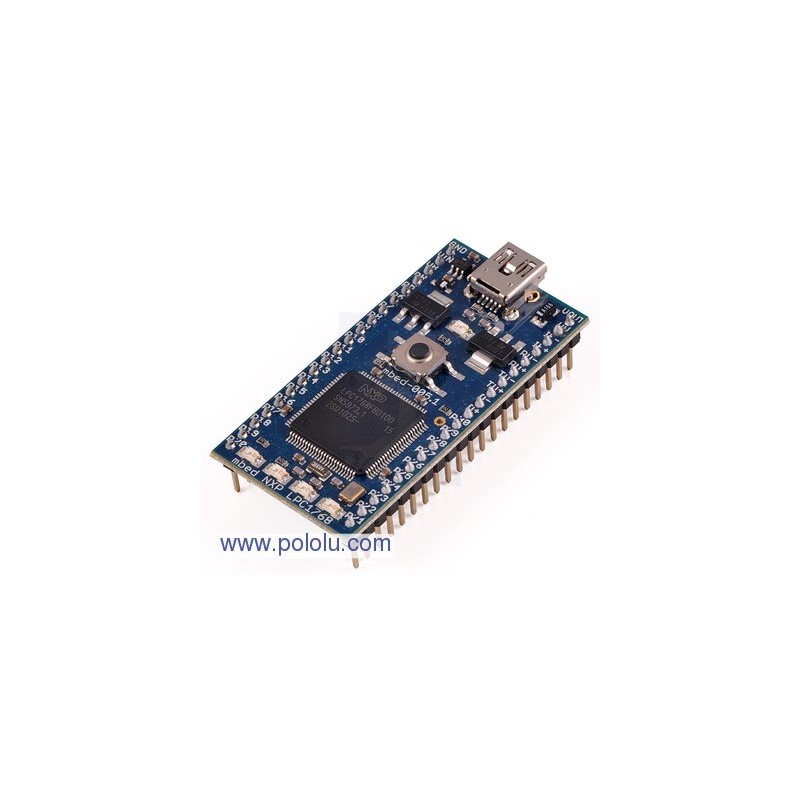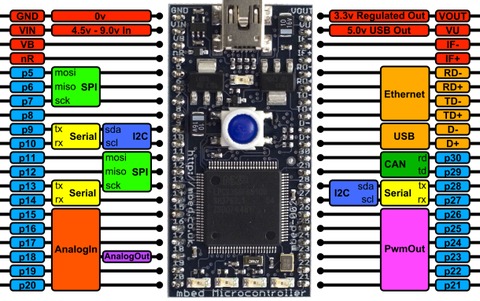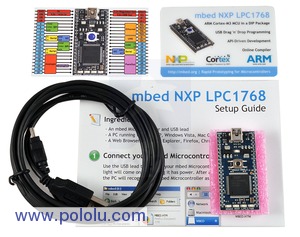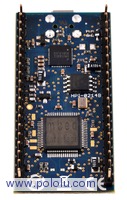- Obecnie brak na stanie

ARM mbed NXP LPC1768 Development Board
The mbed NXP LPC1768 is an easy-to-use MCU development board designed for rapid prototyping. At its heart is a powerful 32-bit ARM Cortex-M3 processor running at 96 MHz with 512 KB flash and 64 KB RAM, which makes it far more capable than popular 8-bit prototyping alternatives. A comprehensive firmware library and plenty of sample code help you get your program up and running quickly, and a free online IDE and C++ compiler means that no software installation is required. Downloading programs is as simple as using a USB flash drive (no external programmer is necessary).
The mbed NXP LPC1768 development board from ARM enables quick and easy creation of high-performance prototypes. Based on the powerful NXP LPC1768 Cortex-M3 processor, which runs at 96 MHz and offers 512 KB flash and 64 KB SRAM, the 32-bit mbed can handily outperform popular 8-bit prototyping platforms like the Arduino and Basic Stamp. The mbed NXP LPC1768 also offers peripherals not typically found on lower-performance prototyping boards, such as ethernet, USB OTG, a 12-bit ADC, a 10-bit DAC for a true analog voltage output, in addition to more common interfaces like serial (UART), SPI, I2C, and CAN. The mbed has a 40-pin DIP form factor with 0.1"-pitch male header pins already soldered in, so it can be used with standard solderless breadboards and perfboards. (Note that while standard DIP ICs have a row spacing of 0.6", the mbed rows have a spacing of 0.9".)
 |
| ARM mbed NXP LPC1768 development board peripherals and pinout. |
|---|
For applications requiring low cost or low power consumption, consider the mbed NXP LPC11U24 as an alternative development board. Our comparison table can help you choose the right mbed for your application.
One of the strengths of this platform is the mbed Library, which provides an API-driven approach to coding that eliminates much of the low-level work normally associated with MCU code development. Code can be developed using meaningful peripheral abstractions and API calls that are intuitive and well tested, freeing you up to experiment without worrying about the implementation of the MCU core or its peripherals.
Another key feature of the mbed is its unique C++ compiler and IDE. These free tools are entirely web-based and run online, which means there is no software to download or install. Supported browsers include Internet Explorer, Firefox, Safari, or Chrome running on a Windows, Mac, or Linux PC. You can log in from anywhere and simply pick up where you left off, and this approach makes it very easy to share code with others. And, since you’re working with a web-based tool, you can be confident that it is already configured and will stay up-to-date. The compiler uses the ARM RealView compile engine, so it produces clean, efficient, optimized code that can be used free-of-charge, even in production. Existing ARM application code and middleware can be ported to the LPC1768 microcontroller, and the mbed tools can be used alongside other professional production-level tools, such as Keil MDK.
|
|
No external programmer is required to program the mbed. When connected to your computer via the included USB cable, it shows up as a mass storage device. Simply save the compiled binary file to the board to program it.
 |
 |
Getting started is as simple as using a USB Flash drive. Simply connect the mbed NXP LPC1768 board to a Windows, Mac, or Linux computer and it will automatically appear as a USB drive. Follow the link on the board to connect to the mbed website, where you can sign up and begin designing. There are no drivers to install or setup programs to run. Getting started is so easy that you can have a “Hello World!” program running in as little as five minutes.
The mbed development board includes the necessary USB A to mini-B cable, a printed quickstart guide, and two business cards that contain a life-size pinout diagram for the mbed.
The following videos show just how easy it is to get started using the mbed:
 |
m3pi Expansion Kit for 3pi Robot |
 |
MinIMU-9 Gyro, Accelerometer, and Compass (L3G4200D and LSM303DLM Carrier) |
 |
Pololu m3pi Robot with mbed Socket |
Producent BTC Korporacja sp. z o. o. Lwowska 5 05-120 Legionowo Polska sprzedaz@kamami.pl 22 767 36 20
Osoba odpowiedzialna BTC Korporacja sp. z o. o. Lwowska 5 05-120 Legionowo Polska sprzedaz@kamami.pl 22 767 36 20
Brak towaru
Brak towaru
Brak towaru
Brak towaru
Brak towaru
MODUŁ PROTOTYPOWY STM32 - ZESTAW ZMONTOWANY I URUCHOMIONY
Brak towaru
Brak towaru
PECEL MIKROKOMPUTER Z PROCESOREM ATMEGA8535 - PŁYTKA DRUKOWANA I ZAPROGRAMOWANY UKŁAD
Brak towaru
Brak towaru
Brak towaru
Brak towaru
PŁYTKA TESTOWA DO KURSU BASCOM AVR MIKROPROCESOROWA OŚLA ŁĄCZKA - PŁYTKA DRUKOWANA
Brak towaru
PŁYTKA TESTOWA DO KURSU BASCOM AVR MIKROPROCESOROWA OŚLA ŁĄCZKA - ZESTAW ZMONTOWANY I URUCHOMIONY
Brak towaru
Brak towaru
Brak towaru
Brak towaru

ARM mbed NXP LPC1768 Development Board
